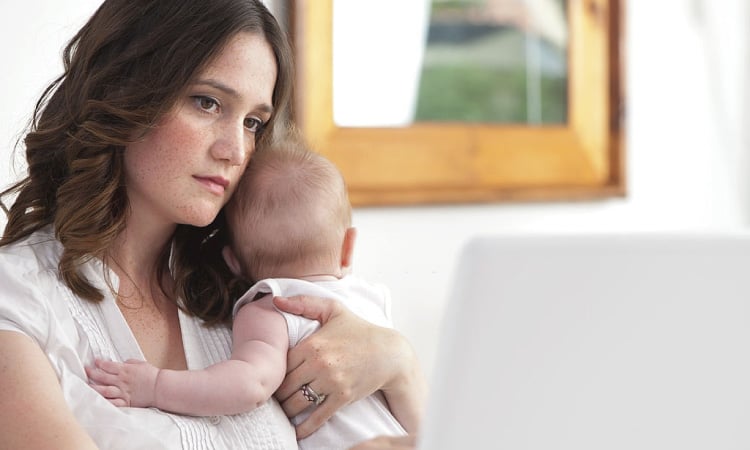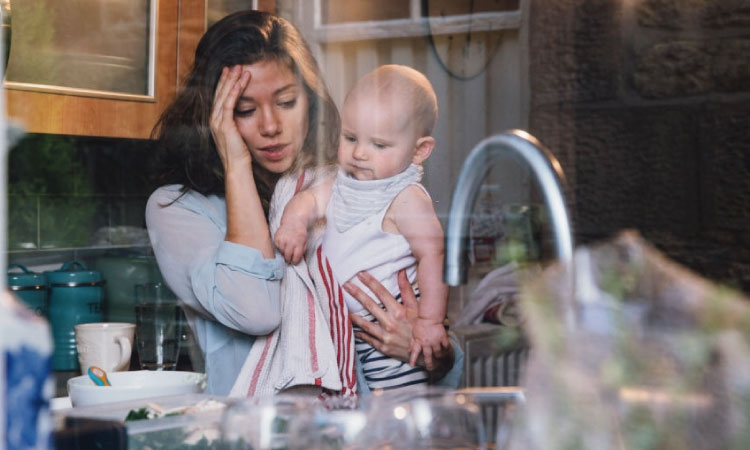Giving birth is the happiest moment in a woman’s life. While childbirth is a joyful event, the postpartum period can be chaotic, exhausting, and confusing. During the postpartum period, many women feel depressed, sad, or lost.
A lot of times women are said to be going through “baby blues” – which essentially means not feeling so great after delivery. Are these signs of postpartum depression? Not always.
Sometimes, these feelings of sadness and depression can last way longer, and are usually stronger than the initial baby blues.
Postpartum depression is a more severe wave of thoughts and mood swings that make a woman feel hopeless and in a rut. And mind you, postpartum depression is not a rare phenomenon. In India, nearly 22 percent of mothers suffer from postpartum depression1.
Postpartum depression can strike any woman. Maybe you or a close family member may suffer or have suffered from it. Recognizing the early signs of postpartum depression is very important.
The reason is that, if neglected, it can progress into a more dangerous situation- where they may begin to think about harming their child or themselves, or even consider suicide. Despite being a serious condition, postpartum depression is treatable.
What Is Postpartum Depression?
Postpartum depression is a complication that occurs after giving birth. It affects the body in physical, emotional, and behavioral ways.
According to our panel gynaecologist and a practicing obstetrician for more than 10 years, Dr Ankita Patel Tayal, postpartum depression can occur up to 1 year after having a baby, but it most commonly starts about 1–3 weeks after childbirth.
The experience is quite different from baby blue – a change in emotions felt by 80% of mothers. Women who have baby blues may feel a bit down, tearful, or anxious in the first week after giving birth, but they will recover on their own after two weeks. But that is not the case if you are a case of postpartum depression.
Compared to baby blues, postpartum depression is much stronger and lasts longer. Postpartum depression results in emotional highs and lows for women. It can lead to severe mood swings, fatigue, and hopelessness.
With postpartum depression, women will frequently cry, feel guilty, anxious, and have difficulty caring for their newborn. Its severity ranges from moderate to severe.
Unlike baby blues, postpartum depression requires medical treatment to manage the symptoms and to re-establish bonding with the baby. First-time moms and those who’ve given birth before are susceptible to postpartum depression.
What Are The Causes Of Postpartum Depression?
Postpartum depression is more likely to return in later pregnancy when a woman has already experienced it during one pregnancy.
Though the exact cause of postpartum depression is unclear, some factors may play a role. The risk of postpartum depression increases with a risky pregnancy. Conditions that can lead to emergency caesarean sections or hospitalizations during pregnancy are among these risks2.
Emotional stress, genetics, as well as physical changes can contribute to this condition.
1. Physical factors
A woman’s hormone levels are among the biggest changes after giving birth. During pregnancy, you have higher levels of estrogen and progesterone. Hormone levels return to normal within hours of giving birth. Depression may result from this sudden change.
The following are some other physical factors to consider:
- Being under the age of 20
- Hypothyroidism
- Variations in hormone levels
- Lack of sleep
- A poor diet
- Underlying medical conditions
- Drug and alcohol abuse
- Trauma from the past
- Stress associated with delivery and childrearing
- No free time at home or work due to added stress
- Sleep problems
- Problems with breastfeeding
- Several perinatal complications were significantly associated with postpartum depression3.
Related Reading: 40 Days After Delivery – 8 Precautions And 6 Ways To Spend Them
2. Genetic factors
Several studies have been conducted to determine the heritability of postpartum depression.
- Family history of depression
- Personal history of bipolar disorder
- Previous history of depression and anxiety
3. Hormonal factors
- Hypothyroidism
- The postpartum depression risk is greater for women with higher oxytocin levels near the middle of their pregnancy4
4. Emotional factors
According to research, women who experience pregnancy loss have a higher risk of postpartum depression than those who deliver normally. This shows emotional factors play a crucial role in PPD.
Research has also shown that social support is important for reducing postpartum depression.
According to one study, women who strongly desire to give birth naturally but who undergo caesarean sections are more at risk for postpartum depression.
Among the emotional stressors are:
- Having recently gone through a divorce or losing a loved one
- If you or your child had serious health issues, or if your newborn ended up in the hospital
- The experience of having a low-birthweight or preterm baby
- Isolation from social interaction
- A feeling of being unattractive
- The burden of financial obligations
- An unintended pregnancy
- Lack of family and friends’ support
- Needing to be a perfect parent, but not being able to do so
When Does Postpartum Depression Start?
The symptoms of PPD begin as soon as you give birth, however, you probably won’t notice it right away since feelings of sadness, exhaustion, and being out of sorts are considered normal in the first few days after childbirth.
Sometimes you may not realize something serious is happening until after the typical baby blue period has passed.
More often postpartum depression begins in the first four to six weeks after birth. Never ignore the signs just because they happen outside of the normal postpartum period. Because PPD can appear at any point within a year after giving birth.
How Long Does PPD Usually Last?
If not treated, postpartum depression can last for months or even years. Women can, however, manage their symptoms and improve their quality of life with effective treatment.
Because PPD can manifest anywhere from a few weeks to a year after birth, there is no standard duration. Approximately 5% of women with postpartum depression experience symptoms for up to three years after giving birth5.
PPD symptoms usually improve over time in less severe cases and resolve 3 to 6 months after onset.
9 Early Warning Signs Of Postpartum Depression

Postpartum depression doesn’t affect everyone the same way. Besides the differences in symptoms, the onset time and duration of PPD between women will also differ considerably6.
Although it may initially be misconstrued as baby blues, postpartum depression has more intense symptoms and can last longer. It can also interfere with your ability to care for your baby and perform other daily tasks. If you recognize early warning signs, you can seek medical attention sooner.
Listed below are 9 early warning signs of postpartum depression.
Related Reading: 15 Tried And Tested Ways To Handle Emotions During Pregnancy
1. Intensifying mood issues
A woman’s emotional wellbeing can be severely affected by postpartum depression. During the first two weeks after delivery, it is common to feel moody, fatigued, and exhausted. You have just given birth and your body has undergone a lot of changes. So has your mind.
If you are still feeling sad or hopeless weeks after birth, and the feelings have intensified, this indicates something more serious than just the baby blues- postpartum depression.
PPD is also indicated by drastic mood changes going from calm to irritable frequently, and by being easily annoyed or angry. You might simply feel unable to function normally and possibly break down every now and then, with even the smallest of things triggering you.
2. Thoughts dominated by grief or guilt
Consider excessive crying for long periods for no apparent reason to be an early sign of PPD.
Having feelings of shame, guilt, or hopelessness, expressing feelings of extreme sadness and despair, and suffering from intense anxiety are all early signs of PPD.
These can be because you do not have support from spouse and friends or family and are finding child-care extremely tiring.
Perhaps you have had to suffer the loss of a loved one in the recent past and that’s at the back of your mind. Financial burdens can also make you think negatively about yourself and the new family member.
3. Finding it difficult to work or accomplish tasks at home
The mother’s anxiety and fear can impede her ability to perform her daily tasks, which is a sign of PPD. Women with PPD have trouble concentrating or focusing.
A woman suffering from postpartum depression often forgets things and is easily distracted. The mood swings and negative thoughts make it very tough to function normally.
Women with PPD tend to avoid tasks and responsibilities. Lack of interest in caring for or bonding with the baby or not wanting to be alone with the baby can be counted as early signs of postpartum depression.
4. Having trouble making decisions
When you are exhausted, it is normal to have trouble thinking. You are fatigued and the baby needs a change or a shower, dinner is yet to be cooked and there is no help in sight. That can make anyone paranoid and you won’t be clear in your head to be able to make any decision.
However, if you have difficulty getting out of bed, getting a shower, or changing your baby’s diaper, it may be an early sign of postpartum depression.
5. Feeling responsible for her own feelings and actions
Not only does postpartum depression affect the mother’s emotions, but it also affects her mental health.
Persistent doubts about being a good mother, as well as taking responsibility for uncontrollable feelings and reactions and self-blaming, may indicate early signs of postpartum depression.
6. Sudden and drastic change in behavior
An individual’s sudden and dramatic changes in behavior can be an evident sign of postpartum depression.
When you feel that someone, you’re close to has transformed into someone who is not who they used to be after delivery, this could be a sign of postpartum depression. If an individual has lost interest in an activity she once enjoyed, this is a clear sign of PPD.
Related Reading: 9 Risks Of Exercising Too Soon Postpartum
7. Physical signs
Stress from the emotional and mental burden of postpartum depression can also lead to physical symptoms in women. The following symptoms should be considered if a new mother constantly complains about them:
- A persistent headache or stomach pain
- Pains and aches in the muscles
- Fatigue due to chronic stress
- Lack of energy
8. Changes in sleeping pattern and appetite
Sleep patterns are significantly altered by PPD. In other words, oversleeping and being unable to sleep can be counted as early signs of PPD. Eating excessively or too little can also be a sign of PPD when it occurs suddenly and becomes persistent.
9. Early signs of severe postpartum depression
In extreme cases, early signs involve:
- A strong feeling of mind is spinning out of control
- Signs of panic attacks include racing heartbeat, shortness of breath, and tightening in the chest
- An obsessive and repetitive behavior involving the changing of the baby’s clothes and cleaning
- Intrusive thoughts of harming the baby and being horrified by these thoughts
- Self-harming intention
If you notice more than one of the above signs and patterns in your loved one, then this may be an indication of postpartum depression.
When to seek immediate medical attention?

It’s important to seek medical attention as soon as possible if:
- Depression symptoms don’t disappear after two weeks
- Symptoms are getting worse
- Taking care of the baby becomes challenging
- Making everyday tasks difficult
- Exhibit feelings of self-harm or harming your baby
Dr Ankita Patel Tayal, MD obgyn, says that when recognised early, postpartum depression can be treated with medications categorized as antidepressants. Talk therapy also is used to treat depression, sometimes with medications.
Conclusion
More often women with PPD may not know or acknowledge that they are depressed. The signs and symptoms of depression may not be recognized by them. Help your friend or loved one seek medical attention immediately if you suspect they suffer from postpartum depression. Waiting and hoping for improvement won’t help.


